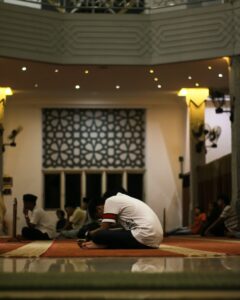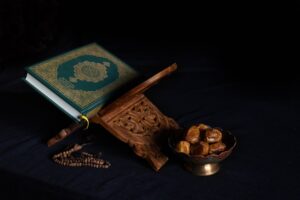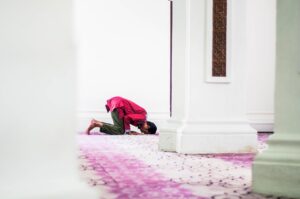Equipping and Mobilizing the Church to Reach Muslims Everywhere
Author: Mark HausfeldENGAGING MUSLIMS
We are at a tipping point, and it is the point of engagement.
One writer recently observed, “America is home for Muslims from every nation in the world. The only Muslim community that is as ethnically diverse as America is the temporary community in Mecca, Saudi Arabia, during the annual pilgrimage.”1
God has given us the opportunity and responsibility to impart the gospel of Jesus to Muslims from all over the world, right here in America. The call to reach Muslims in faraway lands is the same call that beckons us to reach them in our own neighborhoods. Jesus charges us to “preach the gospel to all creation” (Mark 16:15).
There is a marvelous line in Paul’s letter to the Galatians that says, “But when the set time had fully come, God sent his Son … ” (Galatians 4:4).
Paul is not talking about chronological time. He uses the Greek word that refers to an “opportune time.”2 In 2 Corinthians 6:2, he says, “I tell you, now is the time of God’s favor, now is the day of salvation.”
We believe that for the Muslim world! As the Church, we must engage the Muslims God has sent us with this wonderful plan for salvation, which He has entrusted us to share. Mission is not where, but whom. The unreached are in our midst. What missional characteristics of the local church are biblical necessities if such unengaged and unreached peoples are to be reached with the gospel? God through His Word calls us to be a people of peace, presence, proclamation, and power among unreached Muslims in our publics.
PEOPLE OF PEACE

The opportunity to engage the Muslim diaspora in America is also our greatest challenge. This is particularly true as our nation, sensing the threat of Islam, wrestles with growing tension and resentment.
I will venture a confession here. Our family evacuated Pakistan following 9/11. We were living there during that momentous event. Our hearts were heavy for our nation’s loss. We also grieved for the innocent people in Pakistan caught in the turmoil.
We returned to the United States to wait for the right time to return to Pakistan. On the Sunday morning of March 17, 2002, I was preparing to travel to another city to preach when I received a phone call from a colleague in Florida. He had served with me on the mission field, and his family was also waiting to return to Pakistan.
“Turn on the news,” he said. “They have bombed our church.”
I switched on the news channel, and the first images I saw were of the front of our church in Islamabad, Pakistan. Medical first responders were carrying members of our congregation to waiting ambulances. I knew each person I saw on the television screen that morning. I canceled the service and asked my wife to order tickets. I had to return to Pakistan to begin member care in my church.
As I later learned, two Al Qaeda terrorists came into our church during the morning sermon. They cried, “Allah Akbar!” Then they threw six Russian-made hand grenades into the packed congregation of over 250 people. Three of the six hand grenades exploded. One terrorist also detonated the explosive vest he wore. The attack killed four people and wounded 85.
I was enraged. I wanted revenge. At that moment, I was filled with hate for Muslims. They had attacked my church; they killed and wounded people with whom I worshipped each week. As the hate filled my heart, the Holy Spirit stuck His finger in my chest and said, “I died for those terrorists.”
I remember thinking, Yes Lord. You did. The Holy Spirit returned my heart and mind to a biblical and kingdom of God perspective of Muslim peoples.
Current world events have set most Americans on edge, at least to a point. American Christians struggle with the threat of Islam as well, but as a Church that is committed to reaching them with the gospel, our engagements with Muslims must first communicate that we are a people of peace — the antithesis of a world at war, the illogical response to insult and threat.
Interestingly, after Jesus dispersed the 72 evangelists who preceded Him to “every town and place where he was about to go” (Luke 10:1), He told them, “When you enter a house, first say, ‘peace to this house’” (Luke 10:5).
The Muslim greeting assalamu alikum literally means, “Peace be upon you.” For Muslims, it’s not an optional greeting. The Hadith requires it3 and prescribes etiquette for its use. We should always be prepared for honest, peaceful exchange. A peaceful presence keeps open the doors for ministry.
Don McCurry, author of Healing the Broken Family of Abraham: New Life for Muslims, wrote:“Because of a long history of animosity between Muslims and Christians, Christians may be tempted to allow an unforgiving and resentful spirit to poison their attitudes.”4
Today’s radical Islamic climate cannot be the Church’s excuse for abrasive, defensive responses — or, for that matter, offenses. A compelling example of peaceful response followed the murders of three key leaders of the Turkish Church in Malatya, Turkey, on April 18, 2007. A German missionary and two Turkish lay workers thought they were meeting to share with seekers. As the enemy would have it, the seekers were actually imposters who brutally tortured these brothers before taking their lives. Two of the murdered Christians left wives and young children; one was single. The murders devastated the small Christian community, but their response was one of amazing peace. In the days that followed, major newspapers featured the story of Suzanne, one of the widows, who said: “I forgive the ones who did this.”
A few days later, another Turkish leader reported on the nation’s reaction to Suzanne’s response to the murders: “How to summarize what is happening there is hard … but what I am about to say, I don’t say lightly. It is as if a spiritual earthquake has hit the country through these events. What has happened, many have said has brought the message of the gospel to the ears and eyes of the country in a way no one could have imagined.”5

PEOPLE OF PRESENCE
It should follow that a people of peace will be a people of presence or community. The idea that people who pursue peace would be able to live and work in harmony with one another makes a lot of sense. But in a culture where individualism and the right to personal expression takes precedence over group considerations, this is a challenge. However, the church that engages the Muslim diaspora will accomplish little if it does not understand the importance of community. Community is how we will engage Muslims in friendship, and it is vital to post-conversion relationships.
A very practical and deeply meaningful element in the lives of Muslims is the place of ummah — the worldwide fellowship of Muslim believers with their god living in its midst.6 For the Muslim, most everything happens in community. The good of the family has priority over the good of the individual.
“Next to the extended family the wider community is the focus of loyalty,” McCurry says.7
The individual’s importance rests in his contribution to common welfare and the prosperity of his society.8 If he does something admirable, the community is honored. If he commits a public sin, the community is shamed and has to punish him to restore its honor. Muslims find their identity and security in this place of community. It is where they live; it is where they feel they belong.9
Loss of community is a fate worse than death for many Muslims. It is the penalty one pays for breaking laws, and it is what keeps many Muslims from leaving the faith. In America, a male apostate may lose his wife and children. If a woman converts to Christianity, she is at her husband’s mercy. He may keep her or divorce her.10 A convert is considered a traitor to the community and a renegade from the faith. No mercy is to be extended.11 The Qur’an (Surah 4:88), even forbids community members from helping family members or friends who have accepted Christ. It says, “Would ye guide those whom God hath thrown out of the way?”
A Muslim who converts risks losing everything. The church that engages a Muslim must understand the risk this individual takes and must be ready to offer community where it may no longer exist. That can be a tedious, cumbersome task, but it is the culturally relevant way to show love to him or her. Muslims understand community.
Muslims who come to faith learn to appreciate the body of Christ as community. They find comfort and encouragement when they become aware that the Church is more than a building and that they are really part of a God-community. Discipleship matures them, but community must always be present in the discipleship process.
In David H. Greenlee’s book, From the Straight Path to the Narrow Way: Journeys of Faith, he cites Abraham Duran’s insightful words on the role of community in outreach to Muslims: “The beauty of Jesus is shown in community. The Church is His Body and His temple in this world. For Muslims to see the beauty of Jesus they need to see a community committed to Him and to each other — a community walking in love, goodness, peace, and joy; a community of people who paradoxically show power and weakness; a community of struggling but overcoming people just like them. They need to see that, even if they are forsaken and rejected by their physical families, they will be embraced in the loving arms of Jesus, manifested in flesh and bone in his church.”12

PEOPLE OF PROCLAMATION
The primary purpose of the baptism in the Holy Spirit is empowerment to proclaim the gospel of Jesus Christ (Acts 1:8; 2:4). The infilling of the Holy Spirit is Jesus’ endowment of power for all of God’s people to share Christ — not only in lifestyle, but verbally as well. The Church in the United States has opportunities to reach Muslims like no other body of believers in the world. Our context of freedom positions us for proclamation of the gospel to Muslim peoples.
Pastor Jared Stoner of West County Assembly of God in St. Louis says, “If we are willing to pay to send people to the other side of the world to do what we are unwilling to do in our own neighborhoods, we are the worst of hypocrites.”
Therefore, to do this effectively, doesn’t it make sense to equip and mobilize our churches to engage and reach Muslims in our communities? (See the sidebar, “New Muslim Awareness Curriculum.”) I have had the joy of leading Muslims to faith in Christ in Pakistan where we served with Assemblies of God World Missions. However, I have had the same joy sharing the gospel and giving out Bibles and showing the JESUS film to Pakistanis in Chicago, as well as Moroccans and Saudi Arabians in Springfield, Missouri. Again, mission is not where, but whom.
Imagine the local church in the United States equipped and mobilized to reach Muslims. We have the potential to change the world if we only act on this God moment. Former Muslims could visit or return to their native lands and share the gospel with family and friends. Many would return to places that our missionaries cannot go because of geopolitical hindrances.
The Church in America must make the most of the freedom we relish. We must train local church members to proclaim the gospel to the Muslim peoples God has divinely brought to our country (Acts 17:26,27). It is missiological lip service to claim a burden for the ends of the earth and neglect unreached peoples in our Jerusalem and Judea. We are a people of proclamation!
PEOPLE OF PENTECOSTAL POWER
People of the Muslim diaspora need the Church to engage them as people of peace, people of presence, people of proclamation, and people of power.

McCurry says, “In our work with Muslims, it is inevitable that we will encounter power, for Islam itself is about power. Although there are many references to mercy and compassion in the Qur’an, the overriding impression of God in that book is one of irresistible power.”13
Muslims desire to experience the power of God. A barren woman drinks zamzam water (“holy” water from a spring believed to have supplied water for Hagar and Ishmael when theirs ran out in the desert) because she believes it has power to help her conceive. A father visits the shrine of a deceased religious leader, called a Pir, because he believes the Pir’s spirit will intercede for him, and Allah will meet his special needs. Any Muslim I have ever offered to pray for has been eager for me to do so. Muslims believe in miracles.
Nabil and I became friends at language school in Pakistan. Our casual conversations morphed into studies that took us through the Qur’an and the Bible. The stories of Jesus and His miracles interested him the most. This exchange went on for months. He began attending church with our family, at considerable personal risk. Nabil had not yet professed Christ, but he was drawn to Him in a special way.
One day I received a dreadful phone call. A car had struck Nabil as he rode his bike home from school. I rushed to be with him at the hospital. He had severe head injuries, including a fractured skull, and was thrashing violently in his bed. I asked him if I could pray for him, and he made it plain that he wanted me to pray for him in Jesus’ name. He said that boldly, in front of Muslim family members and others who were in the ward with him. I prayed for him and promised him I would be back to see him the next day.
The next day Nabil’s hospital bed was empty, so I went to his home. When I knocked on the door, Nabil answered and invited me in. Before offering so much as a greeting, he asked if what he had experienced was the healing power of Jesus we had talked about in our times together. Happily, I affirmed this was the case. Nabil embraced this Christ who healed him.
We have heard many stories of Muslims coming to Christ through dreams and visions as well. Pinar dreamed she was standing at the edge of a wide chasm, and she knew that Paradise was on the other side of that chasm. Her only way to reach the other side was by crossing on a thread the thickness of a human hair. She began to cross over on the thread, but before long she slipped off. As she was falling, a large hand scooped her up and gently placed her on the other side. She looked in her hand to see she was holding a white stone. She had no idea what her dream meant, but when one of our Central Eurasia missionaries explained it to her, she immediately accepted Christ.
Pentecostal theology is a theology of power. Signs and wonders confirm the Word of God. They tell Muslim people that God’s message is reliable. For the Church to engage Muslims in Pentecost, we have to be Pentecostal ourselves. Will a Muslim who comes into community in our churches see prayers being answered? Will he see gifts of the Spirit in operation? Will she experience healing? Will he see demonic forces expelled? Will she hear messages in tongues with interpretations? Will he understand the role of the person and work of the Holy Spirit in the life of the believer, because he is being discipled in the ways of Pentecost?
One missionary, a worker among Muslims for the past three decades, said: “Muslims must experience the baptism in the Holy Spirit. It is a foundational belief of Islam that Allah is so ‘other’ that nothing man can imagine or say about him would be as he truly is. Tied in with the ‘absolute otherness’ of Allah is the correlate that he could only send his Qur’an to Mohammed by way of an angelic intermediary. He could never have intimate, personal contact with man. The baptism in the Holy Spirit is an experience that shatters that bondage. It puts a Muslim follower of Christ into personal, intimate, loving, profoundly caring, face-to-face contact with the Lover of His Soul. And until that intimacy is established, Muslim believers will forever be at risk of simply substituting one set of regulations (Islamic) for a better set of regulations (Christian). After one has received the Holy Spirit, however, he/she can never again say, ‘I’ve never met God.’ It helps them break through to that level where they can truly experience a day-to-day relationship with Christ.”14
Muslim converts who live in the spirit of Pentecost have the one thing Islam cannot give them: A relationship with a loving Christ who is intimately and powerfully the center of their lives. If we are not Pentecostal in the presence of Muslims, we may deprive them of salvation itself. An encounter with God’s power is vital to their salvation process.
CONCLUDING REMARKS
God has caused a Muslim diaspora to come from some of the world’s most restricted access nations to a place where Muslim people are set to receive the gospel message of Jesus Christ. It does not take great discernment to see that God is giving His Church divine opportunity to reach and lead them into life everlasting.
In Genesis 16:8, the angel of the Lord asked Hagar, “Hagar, slave of Sarai, where have you come from, and where are you going?”
May the Lord of the Harvest enable us as we answer the call to lead Hagar’s Islamic descendants in this journey, so that at the end of the day, millions of Muslims might respond in this way: I was born into slavery (Galatians 4:23), but now I am a child of promise (Galatians 4:28), for Christ has set me free (Galatians 5:1).
NOTES
1. “Reaching the Muslim World for Christ in America,” Truth for Muslims, http://www.truthformuslims.com/listen.htm (Quote accessed May 30, 2014. However, the website is currently deactivated).
2. Raymond J. Bakke, A Theology as Big as the City (Downer’s Grove, Illinois: InterVarsity Press, 1997, 116–117.
3. Hadith means “story.” The Hadith are the collected sayings and examples of Muhammad. They are the highest written authority for the Muslim except for the Qur’an. Ergun Mehmet Caner and Emir Fethi Caner, Unveiling Islam: An Insider’s Look at Muslim Life and Beliefs (Grand Rapids, Michigan: Kregel Publications, 2002), 249.
4. Don McCurry, Healing the Broken Family of Abraham: New Life for Muslims (Colorado Springs, Colorado: Ministries to Muslims, 2001), 169.
5. John Weed, email message to the author, April 28, 2007.
6. McCurry, 322.
7. Ibid., 297.
8. Idid., 166.
9. McCurry, 297. “Humanly speaking, the Muslim finds his ultimate significance in belonging to the household of Islam, or the dar-ul-Islam.”
10. Samuel Zwemer, The Disintegration of Islam (New York, NY: Fleming H. Revell, 1916), 34.
11. McCurry, 299.
12. David H. Greenlee, ed. From the Straight Path to the Narrow Way: Journeys of Faith (Waynesboro, Georgia: Authentic Media, 2005), 273–274.
13. McCurry, 166.
14. Doug Clark, email message to the author, October 5, 2007.

